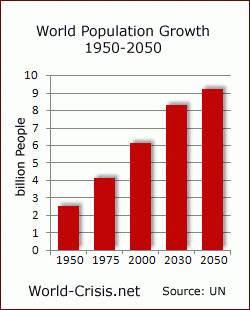JANUARY 3, 2050 (New York) -- Over forty years ago, in a 2009 interview with 13.7 Billion Years, executive director of the Living Oceans Foundation Capt. Philip G. Renaud said, "We're really stressing the Earth's natural resources due to population explosion...This is one of the most difficult issues we humans must come to grips with...If population continues to expand unchecked, we'll be facing food and water shortages and we'll quickly deplete our world's natural resources."
Now that the numbers are in, it is clear that humans did not come to grips with that issue back then. In 2010, the world human population was 6.9 billion. Today, with the population surpassing the 9.3 billion mark according to a new study released the U.S. Census Bureau, the demand for food and energy has jumped 50 percent and the demand for fresh water by 40 percent.
Central Africa faces another famine. Bolivia, Uruguay, and Paraguay have been ravaged by near-constant food riots. China has placed a moratorium on food exports. Warlords across Central Asia exert power primarily by controlling regional water supplies.
In real terms, the world population growth rate has now officially outpaced the current global growth in food production and fresh water availability rates. There are simply too many mouths to feed.
"We have reached the apex of the perfect storm," said Professor Ignatius J. Reilly of the Institute of Climate Change Adaptation. "Unchecked human population growth has led to a list of worldwide crises -- the food crisis, the water crisis, the temperature crisis, the sea level rise, ocean acidification, desertification, and the rapid loss of once-healthy ecosystems. Also, the spread of human habitat over the past several decades has put the final nails in the coffin of the Sixth Extinction."
Noting the United Nations' Intergovernmental Panel on Climate Change identification of human population growth as a "consistent contributor to growth in worldwide greenhouse gas," a Worldwatch Institute report released in 2010 argued that "assuring all women have access to contraception and taking steps to improve women's lives should be among key strategies in the fight against global climate change."
"Population is associated with sensitive issues like sexuality, contraception, abortion, migration, and religion," wrote Worldwatch Vice President for Programs Robert Engelman, the report's author. "But increasing women's reproductive rights should be at the heart of the climate discussion, in the same basket as strategies like increasing energy efficiency and researching new technologies."
Though efforts like the Center for Biological Diversity's "Endangered Species Condom" Program (which distributes 350,000 free condoms annually in the United States), have expanded around the world, there simply hasn't been enough political or popular will to deal with the ills associated with human overpopulation, especially from the point of reproductive rights and contraception.
And when it comes to climate change, there has been a grand imbalance: The poor world is now paying for the past and current excesses of the rich world -- while having many more hungry mouths to feed.
"The dots have been there all along," said Professor Reilly. "But the rich world never really cared to connect them, as that would have revealed the cognitive dissonance that has marked the average Western-based consumerist lifestyle since the end of World War II. No one in the rich world wanted to change their behavior, and now the poor world is paying the heftier price."





